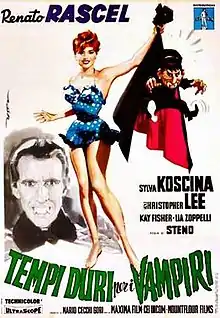Uncle Was a Vampire
Uncle Was a Vampire (Italian: Tempi duri per i vampiri, lit. 'Hard Times for Vampires'[3]) is a 1959 Italian film directed by Steno.[1]
| Uncle Was a Vampire | |
|---|---|
 Italian theatrical release poster | |
| Directed by | Steno |
| Screenplay by | |
| Story by |
|
| Based on | an idea by Mario Cecchi Gori[1] |
| Produced by | Mario Cecchi Gori[2] |
| Starring |
|
| Cinematography | Marco Scarpelli[1] |
| Edited by | Eraldo Da Roma[1] |
| Music by |
|
Production companies |
|
| Distributed by | C.E.I.-Incom |
Release date |
|
Running time | 90 minutes |
| Country | Italy[2] |
| Box office | ₤ 385 million |
Plot
Baron Osvaldo Lambertenghi is forced to sell his ancestral castle to pay his debts. The manor is ingloriously transformed into a frivolous hotel, and Osvaldo is allowed to continue to live there working as a bellhop. One day Osvaldo receives a visit from his uncle, Baron Roderico da Frankurten, who turns out to be a real vampire. Osvaldo tries to warn the various guests of the hotel, with the only result being that he is taken for a madman. Bitten by his uncle, Osvaldo will also turn into a vampire, but his beloved, Lellina, will also be able to free him from the curse.
Cast
- Renato Rascel as Baron Osvaldo Lambertenghi
- Christopher Lee as Baron Roderico da Frankurten
- Sylva Koscina as Carla
- Kai Fischer as Lellina
- Lia Zoppelli as Letizia
- Franco Scandurra as Professor Stricker
- Carl Wery as Director
- Antje Geerk
- Rik Van Nutter as Carla's fiancé
- Susanne Loret as Susan
- Mario Cecchi Gori as Civil law notary
- Franco Giacobini
Production
Uncle Was a Vampire was Christopher Lee's first appearance in an Italian film production.[4]
Release
Uncle Was a Vampire was released in Italy on October 28, 1959 where it was distributed by C.E.I.-Incom. It grossed a total of 385 million lire in Italy.
The film was released in the United States in 1964 on television through Embassy Pictures.[2]
Reception
In his book Italian Horror Film Directors, Louis Paul described the film as "obviously modeled on the slapstick efforts of the comedies featuring the character Totò".[5]
Notes
- Curti 2015, p. 30.
- Curti 2015, p. 31.
- Paul 2005, p. 338.
- Curti 2015, p. 32.
- Paul 2005, pp. 13–4.